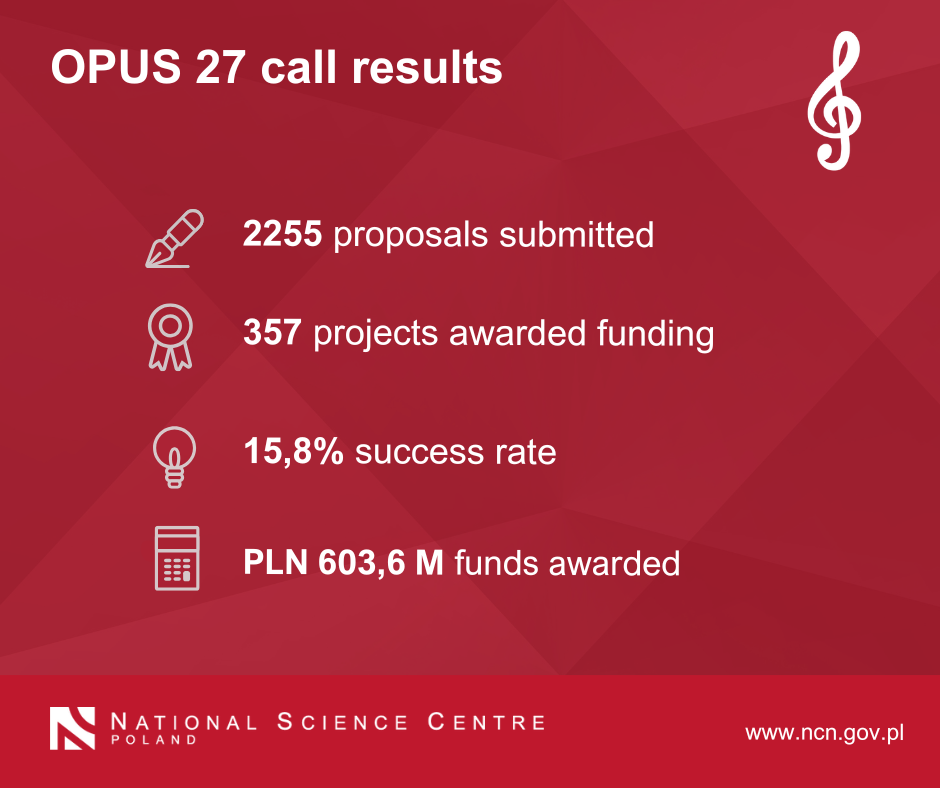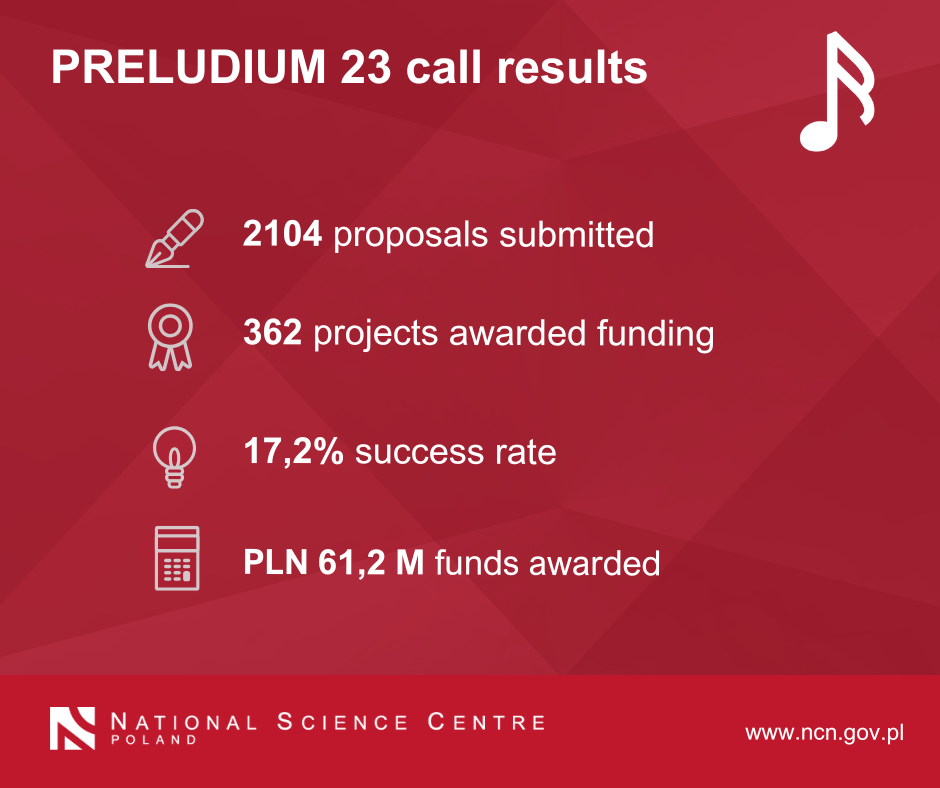Seven hundred and nineteen researchers received grants for research projects in the OPUS 27 and PRELUDIUM 23 calls, with a total value of almost 665 million zlotys. In OPUS alone, a record was set – we awarded funding of 600 million zlotys. The highest budget in OPUS history.
The OPUS 27 and PRELUDIUM 23 calls were announced in March this year. OPUS is a broad-based call, in which researchers at any stage of their research career, regardless of age or level of experience, can apply for funding for basic research projects. With an OPUS grant, they can build large research teams, carry out research projects using large international research equipment, and undertake collaborations with foreign partners. The principal investigator must have at least one research paper published or accepted for publication or at least one artistic achievement or achievement in research in arts completed. Funding can be awarded 12, 24, 36 or 48 months. There is no upper funding limit for a single project and project budgets are included in the evaluation process.

 PRELUDIUM is a unique call on a global scale which provides the opportunity to gain experience in independent research at a very early stage of research career, even pre-PhD. In this formula, early-stage researchers do not have to compete with more experienced scientists, and an important element of the project is the involvement of a mentor to support the principal investigator in the project. A PRELUDIUM project can be planned for 12, 24 or 36 months, with a maximum budget of 70, 140 or 210,000 zlotys, respectively.
PRELUDIUM is a unique call on a global scale which provides the opportunity to gain experience in independent research at a very early stage of research career, even pre-PhD. In this formula, early-stage researchers do not have to compete with more experienced scientists, and an important element of the project is the involvement of a mentor to support the principal investigator in the project. A PRELUDIUM project can be planned for 12, 24 or 36 months, with a maximum budget of 70, 140 or 210,000 zlotys, respectively.
In both calls, the NCN received a total of 4,359 proposals for a total amount of over 3.67 billion zlotys. Proposals were evaluated by experts who were members of the expert teams established by the NCN Council and by external reviewers at the second stage of evaluation. Funding was awarded to 719 projects for a total amount of nearly 664.8 million zlotys. In the OPUS call, grants were awarded to 357 projects worth over 603.6 million zlotys, while in the PRELUDIUM call – 362 projects received funding 61.2 million zlotys. This is the highest financial result in the history of OPUS, and the third highest budget in the history of PRELUDIUM. The success rate was 15.83% in the OPUS call and 17.21% in the PRELUDIUM call, respectively. The indicators are higher than in previous editions thanks to the increase in the budget of the National Science Centre included in the 2025 budget bill and – as a consequence – the decision of the NCN Council to increase the budgets of the calls that have just been awarded.
Over the past few years, due to budget constraints, the NCN has not been able to fund all of the projects that have been highly rated by experts. The success rate should be 25-30% in order to effectively support the most valuable research, maintain the competitiveness of Polish science on the international stage and prevent the outflow of the best researchers abroad. In recent days, the Prime Minister Donald Tusk announced an additional 500 million zlotys in bonds for 2025, which should significantly increase success rates in NCN calls.
OPUS 27 and PRELUDIUM 23 Ranking Lists
For more information on the funded projects, consult the ranking lists.
Research topics of OPUS and PRELUDIUM laureates
In the calls that have just been awarded, funding was given to projects on research into the past, as well as those concerning current global issues in the 21st century, and work on innovative solutions, the development and application of which may facilitate the future functioning of societies, the treatment of diseases and the protection of the environment.
In Arts, Humanities and Social Sciences (HS), the PRELUDIUM grant was awarded to, among others, Mariusz Fornagiel, who at the Jagiellonian University in Krakow will analyse the social reactions of the inhabitants of Slovakia and southern Poland to the economic transition in 1944-1948. In the OPUS call, the HS grant was awarded to Prof. Barbara Będowska-Sójka from the Poznań University of Economics, whose project will investigate the interdependence of financial markets in the context of critical metal price dynamics during the transition to a net-zero economy. In Life Sciences (NZ), Blanka Świderska from the Institute of Biochemistry and Biophysics of the Polish Academy of Sciences is among the PRELUDIUM winners. She will work on a new universal method for the isolation and deep proteomic characterisation of extracellular vesicles that can be used to study drug resistance in a childhood model of epilepsy. OPUS winners in Life Sciences include Dr hab. Piotr Bednarczyk from the University of Life Sciences, who will carry out research into the effects of nano-plastics on cellular damage and analyse the role of mitochondrial potassium channels in this context. Thanks to a PRELUDIUM grant in Physical Sciences and Engineering (ST), Agnieszka Rybarczyk will conduct research at Poznan University of Technology on nano-enzymes as a synthetic alternative to mimic natural biocatalysts. She will address their synthesis, characterisation, and application in the removal of micropollutants from the aquatic environment. The OPUS grant in ST was awarded to Prof. Artur Tyliszczak from the Częstochowa University of Technology, who will work on optimising the oxy-combustion of hydrogen and the co-combustion of hydrogen with ammonia using experimental techniques, high-performance numerical simulations and machine learning.
These are just a few examples; abstracts for the general of projects recommended for funding under OPUS 27 and PRELUDIUM 23 are available on the ranking lists.
Service of decisions
Decisions for rejected proposals and proposals recommended for funding under OPUS 27 and PRELUDIUM 23 have been sent out today. Decisions of the NCN Director are served on the applicants in the form of an electronic document to the electronic address indicated in the proposal form. Service of decisions of the NCN Director
